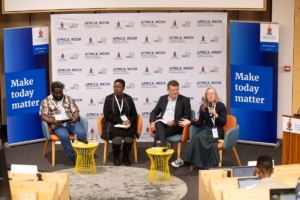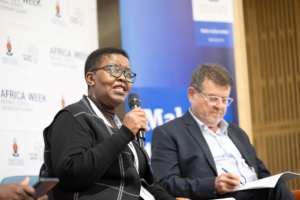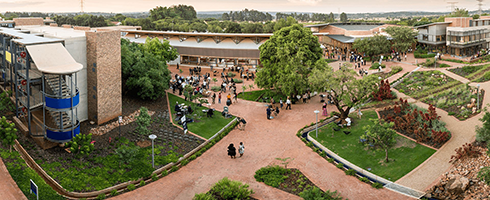You are here: Home1 / Challenge Domains2 / Sustainable Food Systems3 / Africa Week 2025 panel discussion: ‘Africa’s food insecurity is a global sec...
Africa Week 2025 panel discussion: ‘Africa’s food insecurity is a global security issue’
PRETORIA – Every night, more than 800 million people around the world go to bed hungry. Of these, roughly 500 million live in areas affected by conflict. In Africa, one in five people face hunger daily – and, as the impacts of climate change worsen, these numbers are expected to rise.
This isn’t just a development challenge. It’s a global emergency with cascading effects on political stability, economic systems and the environment.
That was the message from experts who spoke during a panel discussion on food security as part of Africa Week 2025, hosted at the University of Pretoria’s (UP) Future Africa. The session, held on Wednesday 28 May 2025, focused on the deepening food crisis in Africa and around the world, and the urgent need for integrated, long-term responses.
Claire Quinn, Professor of Natural Resource Management at the Sustainability Research Institute, University of Leeds, and a Visiting Fellow at Future Africa, moderated the panel. The panellists were Professor Patrick Caron, Chair of Agropolis International and Vice-Chair of the Consultative Group on International Agricultural Research (CGIAR) Integrated Partnership Board; Professor Lindiwe Majele Sibanda, Chair of the CGIAR System Board and Extraordinary Professor at UP; and Dr Selorm Dorvlo, Senior Lecturer of Agricultural Mechanization at the University of Ghana.
The panellists highlighted the links between hunger, conflict, climate change and governance failures and explored opportunities for Africa to lead through innovation, science and systems thinking.
Prof Caron opened the discussion with a global overview of food insecurity, tracing the evolution of the concept since the first global food summit in 1974. What began as a concern about supply and price volatility has become a far more complex crisis, he argued, shaped by conflict, climate disruption and inequality.
He highlighted the close links between conflict and food insecurity, noting that hunger is both a result and a driver of instability. The challenge, he said, is not only to respond to crises, but to address the systemic vulnerabilities that make societies more prone to them.
“We have to look at it as a vicious cycle,” Prof Caron said. “It’s not just that conflict is generating food insecurity, it’s also food insecurity generates conflicts – and this connection goes in many ways.” He explained that conflict disrupts farming, markets, infrastructure and supply chains. On the other hand, hunger and malnutrition fuel unrest, displacement and political instability.
“Access to land, water and biodiversity resources is a strong driver of both conflict and food insecurity,” he said, adding that responses to these driving factors must go beyond immediate relief and focus on long-term investment in agriculture and rural development to prevent future instability.
Prof Caron said institutions like CGIAR have a critical role to play in this transformation. Originally designed to support commodity-based agricultural productivity, CGIAR now addresses more complex, systemic challenges. “The mission now is to deliver science and innovation to transform food, land and water systems in the context of a climate crisis,” he explained.
Food security through an African lens
Recasting the discussion from an African perspective, Prof Sibanda reiterated that the definition of food security must go beyond its 1974 roots, when it was shaped by high prices and rapid population growth.
“The 2025 definition of food security must include conflict,” she said. “It must also speak to climate and environmental security, knowledge security, health security and economic security. These are the chapters of the book that we at Future Africa must now write.”
Africa, she said, has long been the “museum of food insecurity” on global maps. “But with science, we can change that. The good news is Africa is preparing to meet the challenge.”
Prof Sibanda pointed to the African Union’s (AU) updated Comprehensive Africa Agriculture Development Programme, endorsed by heads of state earlier this year in Kampala, Uganda, and the 2023 Nairobi Climate Declaration as signs that the continent is aligning its food systems agenda with climate action, policy reform and research investment.
At CGIAR, she said, one of the most significant developments is a flagship programme on fragility, conflict and migration. “We are collecting real-time data in the Sahel, Ethiopia, Nigeria, Somalia, Zambia, all the hotspots for all the conflicts and all the threats and risks that we are facing that are making us food-insecure.”
From crops to systems
Dr Dorvlo responded to the panellists’ presentations by reflecting on the shift from food production to food systems. “We are no longer talking about food as an isolated issue,” he said. “We are talking about the systems around food: data, policy, infrastructure and climate resilience.”
From his perspective as a researcher working with rice farmers in Ghana, Dr Dorvlo emphasised the need for improved technologies that can raise yields and reduce disparities in production. “For example, in Ghana, you have different production sections, and there are communities that do as low as 30% of the yield that they are supposed to get, and no matter what they do, that’s the average yield that is expected of them.”
Dr Dorvlo also stressed that these advancements in food systems must be accompanied by a re-evaluation of how food security and insecurity are defined, particularly within the African context. “When we redefine what food security or insecurity is, how do we ensure that the different ideologies and identities within the African perspective are brought into this? We must ensure that the definitions reflect who we are and who we want to become.”





